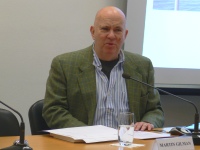Registration
Thank you!
You will receive an email confirming your registration.
IMGXYZ2902IMGZYXThe Russian default of 1998 was avoidable until a very late stage. Martin Gilman, former senior International Monetary Fund (IMF) representative in Russia and director of the Centre for Advanced Studies at Moscow’s Higher School of Economics, analyzed the crisis and the lessons learned from it, during a presentation of his new book, No Precedent, No Plan: Inside Russia’s 1998 Default, at the Carnegie Moscow Center. Carnegie’s Sam Greene moderated.
Russia and the IMF: An Unlikely Partnership
- Russia after the collapse: Russia emerged from the Soviet collapse in late 1991. The country faced an unprecedented challenge, with no plans or easy solutions on how to move forward. As a result, Russia’s policy response to the economic collapse stemming from the disintegration of the Soviet Union was chaotic.
- The IMF’s challenge: Gilman, who was part of the IMF mission to Russia at the time, acknowledged that he is not an unbiased observer of these events since he participated in the meetings between the IMF and Russian authorities. Starting in 1992, when the IMF first engaged with Russia, the country presented a huge challenge, he said. The IMF traditionally helped countries that had a temporary balance-of-payments problem and was not prepared to deal with an imploding economy. Although the IMF became involved, since there was no alternative, its impact (and that of the G-7) was marginal.
The Crisis Was Not Pre-Ordained
- Creation of the GKO market: Many observers believe the creation of the GKO (a short-term government bond) led to the formation of a Ponzi scheme, which in turn caused the crisis. Gilman, however, argued that the GKO market was created with good intentions—to broaden and deepen the market, provide credit to those who did not have access to the Central Bank, bring down interest rates, and provide benchmarks for the private sector.
- The role of fiscal policy: While fiscal policy failed to keep up with monetary reforms, Gilman contended that this was not intentional and did not cause the default. However, he noted the real turning point for Russia may have been March 23, 1998, when President Boris Yeltsin fired his prime minister, Viktor Chernomyrdin. The prime minister understood the economy better than anyone else at the time, and recognized that fiscal policy had to come under control, especially revenue generation.
- Often blamed factors: Observers have offered various reasons for Russia’s crisis, but Gilman argued that each was flawed. Some experts contended that Russia’s debt burden after the Soviet collapse was too high—but including the $102 billion of Soviet debt, Russian total debt at the time was only 63 percent of its GDP—much better than many major economies (including the United States, Britain, Brazil, and India) in 2010. The Asian crisis—which complicated the situation in Russia—and the fact that many oligarchs stopped paying taxes after “buying” Yeltsin’s 1996 re-election were also not to blame, Gilman said.
What Really Happened
- Stock vs. flow of debt: The real cause of the crisis was the $55 billion GKO market that constituted only 27 percent of Russia’s total debt, Gilman said. The crisis resulted not from the debt level itself but from its flow—it had become too costly to serve the debt every week when the market was “cleared” (all debts and payments were matched), and rates changed quickly in a nervous market that became unsustainable.
- A rare default: Despite this, Gilman argued that the crisis was still avoidable: the authorities only had to convince the market that the money would be repaid. He pointed out that a default on sovereign public debt is extremely rare, simply because a government can always print the money to repay its debt. He noted that Russia did not default on its external debt because it wanted to maintain its credibility in the international community.
- Why Russia didn’t print the money: Russia decided not to print additional money, however. By mid-1998, Yeltsin’s two biggest achievements were stabilizing the ruble and taming inflation. Printing more money would undo these accomplishments and perhaps even create Weimar-like hyperinflation. Russia, according to Gilman, considered it far better to attack the small GKO segment of the market.
Lessons for Russia and the World
- Lessons for Russia: Citing a conversation with Elvira Nabiullina, Russian minister of economic development, Gilman said many officials felt the IMF and other institutions played a marginal role in the crisis itself. They said, however, that working with the IMF taught Russian authorities to think through problems more comprehensively. After this experience, the Russian approach to economic and financial problems became much more pragmatic.
- Lessons for the world: Gilman believes that the world has not learned these lessons. Though much work has been done to identify the probability of crises using ratios like stock and flow of debt as well as short-term currency debt to reserve ratio, the 2010 European debt crisis still took most observers by surprise. According to Gilman, governments have become accustomed to borrowing money at cheap interest rates rather than raising revenues—as happened in Greece and Ireland, where the debt levels remain very high. Gilman concluded the markets will never believe that Europe would default on its debt, until it actually does so. Meanwhile, he concluded that the results of the upcoming Irish elections will be interesting to watch, especially if they usher in a new approach of dealing with public debt.
